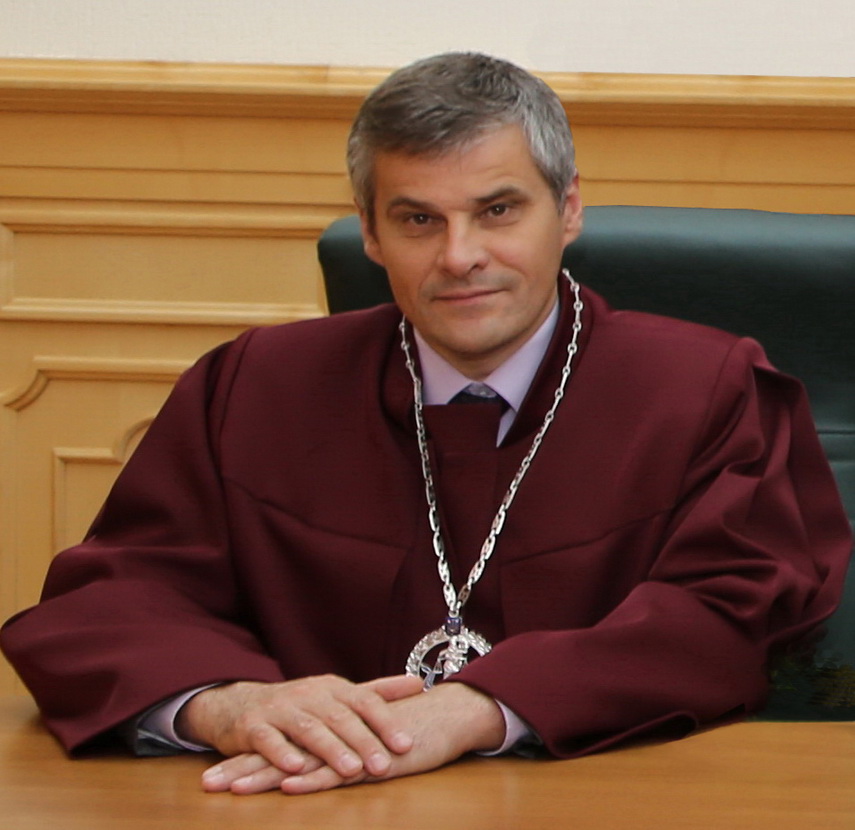Information and analytical sector
of CONSTITUTIONAL COURT of UKRAINE
01033, Kyiv, Zhylianska, 14
tel. 238-10-80, 238-10-25
fax. 287-36-16
Speech delivered by the judge of the Constitutional Court of Ukraine Mykola Melnyk at the XVII Congress of the Conference of European Constitutional Courts
(Batumi, Georgia, June 30, 2017)
 "In the course of the discussion, I would like to make brief comments on the issues discussed today.
"In the course of the discussion, I would like to make brief comments on the issues discussed today.
During this Congress much has been noted about the role of constitutional courts in defining, observing, disseminating and implementing the constitutional principles. In my opinion, this role depends to a large extent on several factors, namely: 1) the place which is de facto occupied by the constitutional court in the system of state power and determined by the state of democracy; 2) the degree of real independence of the court; 3) the level of its competence (judges' professionalism).
These three factors are interconnected, but the first of them is basic, because it is the place in the system of government that determines the role that the constitutional court will play in the state and society. It depends on whether it will serve the political power, finding legal arguments for its, in essence, political decisions, or will make legal decisions on the basis of constitutional principles and values. It means that the question is whether the constitutional court will be a servant for politicians or a guardian of the Constitution. Given this, the role of the constitutional court in establishing democracy and the rule of law (in particular, the implementation of the constitutional principles) can be either positive or negative.
It is also necessary to clearly understand that at the current level of development of society and the state such a phenomenon as usurpation of state power is impossible without the participation of the constitutional court, its decisions, which only outwardly legitimise the unconstitutional seizure of power. A constitutional court of a particular state may also contribute to the violation of the principles of the international order if it adopts decisions ignoring the principles and norms of international law. The consequence of such decisions may be the change in the constitutional order of another state, the encroachment on its independence, sovereignty and territorial integrity.
Such cases are known in modern history of European constitutionalism. In particular, I refer to the Ruling of the Constitutional Court of the Russian Federation dated March 19, 2014, which declares that the agreement between the Russian Federation and the so-called Republic of Crimea, located on the territory of sovereign Ukraine, is an international treaty, and the so-called Republic of Crimea has an international legal personality.
It is important to note that the Constitutional Court of the Russian Federation formally plays a decisive role in the process of annexing foreign territories to Russia. Under the legislation of this country, an agreement on the accession of a new entity can only be ratified after the Constitutional Court's decision on the compliance of such a treaty with the Constitution of the Russian Federation.
Therefore, without the ruling of the Constitutional Court of the Russian Federation dated March 19, 2014, it was impossible to legally formalise and execute "political will" on "adoption" of the "Republic of Crimea" in the Russian Federation. Having adopted the said ruling, the Constitutional Court of the Russian Federation played a key role in the legal justification of the annexation of the Ukrainian Crimea by Russia. By the way, the case on the compliance of the respective "treaty" with the Constitution of the Russian Federation was considered in one day (or rather - one night since the so-called agreement between the "Republic of Crimea" and the Russian Federation was signed on March 18, 2014, and the Constitutional Court of the Russian Federation promulgated its ruling on March 19, 2014.
It was stated at the Congress that the constitutional courts differ from political authorities, in particular, that constitutional courts require much more time to adopt a legally balanced decision because it should be based on explicit (written) and implicit (unwritten) constitutional principles. In the case of the adoption by the Constitutional Court of the Russian Federation of such a ruling, such difference was not observed, but there was a gross ignoring of all norms of international law and constitutional principles, because no European constitution allows or justifies the unlawful seizure of another state or part of its territory.
The illegality of annexation of Crimea by the Russian Federation has been recognised by the UN, the Council of Europe, including PACE and the Venice Commission.
Therefore, one may address the issues discussed at this Congress which are related to the implementation of constitutional principles purely in theory (in general) and then everything on the European continent will look great. Otherwise, it is possible - on the basis of real constitutional practice, taking into account such decisions as the ruling of the Constitutional Court of the Russian Federation that had "blessed" the annexation of the Crimea. And then the members of the Conference of European Constitutional Courts, with all European tolerance, should have a legitimate question, whether there can be such constitutional courts in modern democratic and legal Europe? And this question, as you may understand, is a matter of principle to be considered in the context of Article 6 of the Statute of the Conference of European Constitutional Courts, which provides for the possibility of joining the Conference only by the constitutional courts which exercise their judicial activities in accordance with the principle of judicial independence, being bound by the fundamental principles of democracy and the rule of law and the duty to respect human rights."

